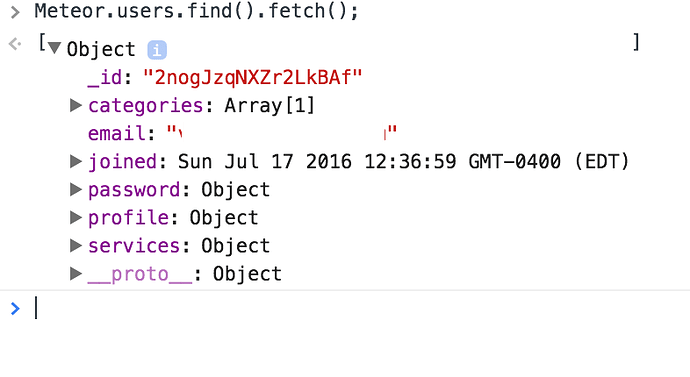Hey guys, so i have been working on my meteor project for some time now and just now I have noticed a problem that I can’t figure out the solution to.
Using the accounts-password package (and its dependents) i made a custom user register/login. I tested it and everything was working fine, so the registration, logging in and logging out. I then moved on to the next steps in my project. Since meteor doesn’t really log you out when you end localhost, since finishing the custom login I have been developing under a testing account so i’m able to see the changes.
Today I decided to log out but when i tried to logging again nothing was happening. I checked the console and no error was popping up, so i entered Meteor.users.find().fetch(); which returned an empty array.
I looked at the log out code which is very straight forward:
"click .js-logout": function(event) {
event.preventDefault();
Meteor.logout();
// Router.go('/');
},
but nothing seems wrong.
After looking at for a while i decided to create another account but when i logged out it deleted the account again. Then i went to the console and ran meteor update thinking it could be the problem, but no luck. I also tried restarting localhost but logging out would still delete the accounts i created. Then i though it was something to do with the package so i ran meteor remove accounts-password and added it again but it still didn’t fix the issue. I event tried installing an older version of the package but it still didn’t work.
I noticed there is a new version of npm-bcrypt but i cant install the latest (0.8.7) because when i run meteor add npm-bcrypt@0.8.7 it says:
=> Errors while adding packages:
While selecting package versions:
error: Conflict: Constraint npm-bcrypt@=0.8.6_2 is not satisfied by npm-bcrypt 0.8.7.
Constraints on package "npm-bcrypt":
* npm-bcrypt@0.8.7 <- top level
* npm-bcrypt@=0.8.6_2 <- accounts-password 1.1.12
I tried to update accounts-password to the latest version (1.1.13) with meteor add accounts-password@1.1.13 but it also doesn’t work:
=> Errors while adding packages:
While selecting package versions:
error: No version of accounts-password satisfies all constraints: @1.1.13, @=1.1.12
Constraints on package "accounts-password":
* accounts-password@1.1.13 <- top level
* accounts-password@=1.1.12 <- top level
I did some research but didn’t find anything.
Please help. Let me know if I should post a specific piece of code that would help.
Thank you in advance.
